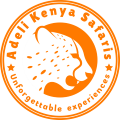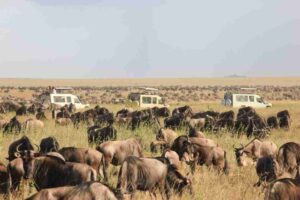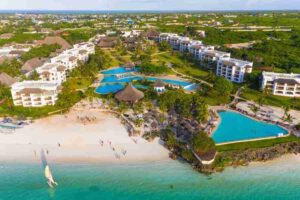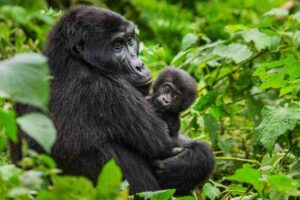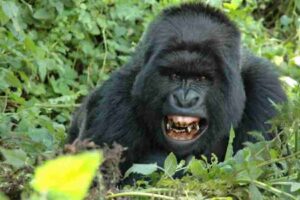| Name of the facility | Porini Lion Camp |
|---|---|
| Certification Achieved | Gold |
| Year opened | 2006 |
| Tourism region | Masai Mara/South Rift |
| County | Narok |
| Address | Ntiakatiak River within Olare Motorogi Conservancy Map It |
| Telephone/Mobile | + 254 20 7123129 |
| info@porini.com | |
| Website | porinisafaricamps.com |
| Facility Notes | Porini Lion Camp is located on the banks of Ntiakatiak River within Olare Motorogi Conservancy. The facility was opened in 2006 owned and managed by Game watchers Safaris. It specifically lies on latitude 36M 0741806 and longitude UTM 9853081. The ten (10) guest tented camp has a bed capacity for twenty (20) guests and a workforce of 26 permanent employees It is operational for ten (10) months in a year, closed during the rainy season. The Olare Orok Conservancy was established in 2006 and later expanded to encompass Motorogi lands, thereby becoming Olare Motorogi Conservancy. It measures approximately 14,164 hectares (approximately 35,000 acres) wildlife conservancy that lies within the Koiyaki Group Ranch, between the Olare Orok River and the Talek – Aitong Road. It shares the Southern boundary with Masai Mara National Reserve; and Naboisho Conservancy to the east. Olare Motorogi Conservancy is a partnership between 277 landowners and five tourism operations, founder members Porini Lion Camp and Kicheche Bush Camp later joined by Mara Plains Camp, Olare Mara Kempinski and Mahali Mzuri. The Conservancy is managed by Ol Purkel Ltd, a not-for-profit company whose shareholders are the operators, controlled by a Board of equal representation from both the landowners and the tourism partners along with representatives from the Olare Motorogi Trust. This ensures that the Conservancy is run in a fashion that maximizes the benefits for all the interested parties. The conservancy model ensures wildlife conservation through tourism enterprises that offer, low impact, exclusive experience to visitors. The landowners lease their land and derive income through payment of lease fees by the tourism operators. The majority of employees and rangers in the conservancy are recruited from the local communities. The conservancy is a part of the Mara-Serengeti ecosystem, providing critical wildlife dispersal area for migratory wildlife, including the wildebeest and other herbivores. It has significant populations of a wide variety of wildlife, wildebeest, Zebras, Thompson’s Gazelle, Impala, elephants, giraffes, spotted Hyena, jackals, warthogs, leopards, cheetah and lion. |
| Energy management | Porini Lion Camp is powered by solar energy fixed with portable battery systems. Each tent has its own solar panel and battery. The staff quartiers and restaurant areas are served by one major solar power inverter system (solar panels). The facility has one kuni booster for guest water heating where water is fetched via buckets and used to refill ‘18litre safari showers’ for clients. Charcoal briquettes are used to run the kuni boiler. The camp has an energy management plan in place with Low wattage energy saving bulbs and LED fixed throughout the facility. Main switches are easily accessible in all the guest tents to save on power. The camp, in addition, has a centralized charging system which helps to regulate power usage. Solar lamps are used to light pathways at night. Guests are briefed on energy conservation on arrival and through information folders in the guest tents while staff is sensitized during departmental briefings |
| Environmental management | Porini Lion Camp has an elaborate Environmental policy formulated through a consultative process involving stakeholders, management and staff. Emphasis is put on responsible and sustainable tourism, local community benefits and environmental management of resources such as land, water, energy and waste. The facility has a clear environmental management system with monitoring action plans in resource use (water, and waste). The records are analyzed based on bed occupancy. |
| Chemical use | LPG is well secured in a contained structure for safety reasons. Gas is bought in 50 kg and 12kg cylinders. Fuel (diesel) storage area is properly contained to prevent accidental spillage to the environment. The fuel is stored in 250 liters reservoirs fixed with a fueling pump. The camp uses biodegradable bathroom amenities in the guest tents. The chemicals are accompanied by Material Safety Data Sheet (MSDS) records and usage demonstrated by supplier. |
| Conservation Criteria | |
| Community Criteria | |
| Solid waste management | The camp has waste management policy with emphasis on 3Rs re-use, reduce, and recycle. Notably, the camp issues guests with an aluminum bottle which they are supposed to refill while on holiday and carry as a souvenir.
Waste separation (paper, plastics, metals and glass) is conducted at source. The waste is later put in larger waste collection bins for further segregation before final disposal to recyclers through Game watchers in Nairobi. Organic waste is managed through compost system. The section is well enclosed to keep off scavengers. In addition, re-usable 18litre dispensers are used to supply water within the facility. Water for drinking in the guest tents is put in re-used wine bottles decorated with beads. |
| Water management | The camp has two main water sources, rain water harvesting and borehole. The rainwater is collected from iron roofed structure and stored in a reservoir of 4,600 liters. Water from borehole is stored in two (2) reservoirs with an average capacity of 92,000 liters. It is metered for monitoring purposes.
Guests are sensitized on arrival on water conservation. In addition, guests are encouraged to re-use their towels through “towel-talks” as a means of conserve water. Staff is sensitized during regular briefings. The guest toilets are fitted with water efficient dual cisterns to reduce on water usage. Guest tents have no running water; rather they are fitted with limited water holding containers. 18 liter ‘safari showers’ are fitted in the guest tents as a water conservation measur |
| Visitor communication & education | Booklets and room information folders are available at guest tents respectively. Publications such as Africa Geographic magazines, Books on Kenya, Masai Mara National Reserve and its ecosystem, Birds of Kenya, Mammals and bird list are availed at the tents and restaurant section. Visitors are briefed upon arrival on the camp’s operations, and environmental values. Sensitization is also emphasized during meals times both by the management and staff. The guest tents are equipped with room information folders to brief the visitors on environmental conservation activities and initiatives |
| Pollution | The camp uses low light emitting solar lamps– to minimize light pollution at night. |
| Environmental conservation | The facility is built on low environmental footprint. The tents are semi-permanent erected on sand and gravel. The staff quarters are made of similar style though smaller in size. Natural vegetation is relatively undisturbed and the camp has retained indigenous species within the facility while the footpaths are demarcated using sand. Porini Lion Camp is one of the founders of Olare Motorogi Conservancy established to promote wildlife conservation and provide economic gain to the landowners and plays a critical role in the management of the conservancy. The facility supports Living with Lions – Mara Predator project – established to monitor lions. Support is done through creating awareness in the guest tents information sheets and with the help of camps guides. Information obtained allows the researchers to map lion habitat, monitor reproduction and identify long term population trends for conservation efforts |
| Waste water management | Grey water from the guest kitchen and staff kitchen is managed through a two compartment grease trap to filter fats and oils before draining into a soak pit. The grease traps are cleaned every two weeks. Grey waste water for the staff quarters, guest tents and public areas is managed through soak-pits. Black water from the guests’ tents and public areas is managed through septic tanks. EM1 bio-enzyme is added in every four days to enhance efficiency. |
| Purchasing and supplies | Vegetables and fruits are packed in reusable crates while meat and dairy products are stored in freezers. Where possible, dry goods are bought in bulk to reduce on the packaging |
| Employment and remuneration/staff welfare | The facility has staff committee which represents staff issues to the management. |
| Staff education, communication and awareness training | The staff is sensitized and briefed during departmental/daily meetings. Notice boards are also used to facilitate communication to the staff. |
| Cultural preservation and promotion/protection of local sites | The camp has detailed room information folders with materials concerning the Masai Mara national Reserve, Olare Motorogi Conservancy, local people and culture. The guests are sensitized on the local Maasai culture and engage in traditional activities such as arrow and spear throwing. Visitors are taken to the local villages for a cultural experience. Curios are bought / purchased at the villages. The staff engages the guests and share information about the local people and culture |
| Benefits to local community/community empowerment | The camp purchases locally where possible, these include, fuel, meat (goat meat for staff meals) and sources curios locally. Most Significant, the camp makes the required entry fee, remittance to Masai Mara National Reserve at 80 USD per guest per night. In addition, pays lease fee, and bed night fee. Porini Safari Camp engages the local people through the parent company – Gamewatchers. In addition the company has established the Porini Trust through which donations are streamlined to the local community. Below are some of the initiatives that have been implemented; • Fees; approximately 33.4 Million is paid annually to Olare Motorogi in form of lease fees, bed night fee and staff salaries • Employment: The camp has approximately 80% of the permanent employees from the local area who mostly comprise of the Maasai people. Casual labor is also sourced locally • Trust; The facility supports Olare Orok Trust in community engagement projects. For instance, the trust has set ups a beadwork program for local women and bee keeping project • Education / Sensitization; Partnered with KOEE (Kenya Organization for Environmental Education) for conservation education in schools in the Mara. Some of the schools are Talek, Leigero, and Nkoilale. |
| Cultural Criteria | |
| Health and safety | Porini Lion Camp has a health and safety policy committed to ensuring a safe and healthy work environment for staff and guests and compliance with legal requirements. The camp has undergone Health Inspection and issued with a Health Inspection Certificate while medical check-ups for food and beverage handlers are up to date in compliance with Food, Drugs, and Chemical substances Act. Cap 254. In addition, there are documented emergency procedures to enhance safety preparedness. The facility is linked to Flying Doctors service for emergency evacuations. Staffs are referred to nearby CMC (Talek) Clinic for medical care. A team of staff has been trained on fire safety and first aid training and well equipped first aid kits are available at the main office and game drive vehicles Fire-fighting equipment including fire extinguishers and fire blankets at the kitchen are serviced and strategically placed within the facility. Fire assembly point is clearly and conspicuously marked within the facility and a fire alarm is also available. The facility has conducted an initial health and safety and risk assessment audit in accordance with section 11 of Occupational Safety and Health Act 2007 and a fire safety audit to comply with Factories and other places of work (Fire Risk Reduction) Rules 2007. |
| Child labor, abuse and human rights | The facility does not employ any person below the legal working age of 18 years. |
| Business Practises Criteria | |
| Entry Date | 13th March 2018 |
Porini Lion Camp
Safe, Sustainable, Affordable & Unforgettable Africa safari experiences that Educate, Connect, Transform and Inspire.
Your dream safari in Kenya & East Africa is just a call or email away. Contact Adeli Kenya Safaris today. Tel: +254720564538 | WhatsApp: +254720564538 | Email: info@adelikenyasafaris.com
Share this:
Why Go with Adeli Kenya Safaris
- Born, raised & based in Africa. Let u show you the Africa we know well and cherish so much
- Africa sustainable travel is our passion
- Great Value for Money. Best price guaranteed
- Experienced team of travel experts
- Knowledgeable & multi-lingual safari guides
- Safety conscious
- Fleet of well maintained vehicles
Your dream safari / holiday is just a call or email away. Contact Adeli Kenya Safaris today. Tel: +254720564538 | WhatsApp: +254720564538 | Email: info@adelikenyasafaris.com
EXPLORE OUR FEATURED EAST AFRICA SAFARI HOLIDAY DESTINATIONS
FEATURED TOURS & HOLIDAY PACKAGES BY COUNTRY
Go Wander the wonderful world with Adeli Kenya Safaris

Africa Safari Tour Packages
Africa is more than just a destination—it is a feeling, an awakening, and a journey that touches the soul in ways words can hardly capture. Africa is a continent that stirs the soul, awakens curiosity, and leaves every traveler forever changed.
Europe Holiday Packages
SouthEast Asia Holiday Packages
Middle East Holiday Packages
Indian Subcontinent Holiday Packages
Central Asia Holiday Packages
Far East Holiday Packages
Australasia Holiday Packages
North America Holiday Packages
Central America Holiday Packages
South America Holiday Packages
Cruise Holiday Packages
Adeli Kenya Safaris, Kenya safari, African safari Kenya, Wildlife safari Kenya, Kenya wildlife tours, Kenya game drives, Safari holidays Kenya, Kenya safari tours 2025, Best Kenya safaris, Luxury Kenya safaris, Affordable Kenya safaris, Masai Mara safari, Amboseli safari, Tsavo National Park safari, Lake Nakuru safari, Walking safari Kenya, Hot air balloon safari Masai Mara, Birdwatching safari Kenya, Family safari Kenya, Photography safari Kenya, Cultural safari Kenya, Beach and safari Kenya, Private safari Kenya, Fly-in safari Kenya, Camping safari Kenya, Luxury tented camps Kenya, Best time to see the Great Migration in Masai Mara, Affordable family safari packages in Kenya, Luxury safari lodges in Kenya with private game drives, Walking safaris in Laikipia conservancy, Hot air balloon safari over Masai Mara at sunrise, Best birdwatching spots in Kenya during November, Family-friendly safari resorts near Nairobi, Photography tours in Amboseli with Kilimanjaro views, Cultural experiences with the Maasai tribe in Kenya, All-inclusive beach and safari packages in Kenya coast, Private guided safaris in the Chyulu Hills, Fly-in safari to remote areas of northern Kenya, Budget camping safaris in Tsavo East National Park, Luxury tented camps in the Mara Triangle for honeymooners, Best wildlife viewing in Kenya during the dry season (July-October), Ethical wildlife safaris in Kenya supporting conservation, Small group safari tours in Kenya for solo travelers, Wheelchair accessible safari options in Kenya, Kenya safari itineraries for first-time visitors, Best Kenya safari for seeing rhinos, Tanzania safari, African safari Tanzania, Wildlife safari Tanzania, Tanzania wildlife tours, Tanzania game drives, Safari holidays Tanzania, Tanzania safari tours 2025, Best Tanzania safaris, Luxury Tanzania safaris, Affordable Tanzania safaris, Serengeti safari, Ngorongoro Crater safari, Zanzibar safari, Tarangire safari, Lake Manyara safari, Ruaha National Park safari, Nyerere National Park (Selous) safari, Kilimanjaro safari (often combined with wildlife), Mahale Mountains chimpanzee trekking, Gombe Stream chimpanzee trekking, Best time to see the Great Migration in Serengeti, Luxury lodges in Ngorongoro Crater with wildlife viewing, Family safari packages in Tanzania with beach extension, Walking safaris in northern Tanzania, Hot air balloon rides over the Serengeti plains, Birdwatching tours in Lake Manyara National Park, Cultural tours in Tanzania combined with safari, Affordable camping safaris in Tanzania’s southern circuit, Photography workshops on Tanzania safaris, Honeymoon safari packages in Serengeti and Zanzibar, Wildlife safaris near Arusha for short trips, Chimpanzee trekking tours in western Tanzania, Best Tanzania safari for seeing the Big Five, Small group safari tours in Tanzania for solo travelers, Tanzania safari itineraries including Kilimanjaro trek, Ethical and sustainable safari options in Tanzania, Fly-in safaris to remote parks in Tanzania, Best time for wildlife photography in Tanzania, Tanzania safari deals and discounts, Serengeti Great Migration river crossing tours, best tour company in Kenya, best safari company in Kenya, best tour operator in Kenya, best travel company in kenya, best travel agency in kenya, best kenya safari company, nairobi safaris, nairobi kenya safaris, kenya safaris, safari in kenya, kenya wildlife safaris, kenya safari tour, kenya tours, Best responsible tours and travel agency in kenya, Best responsible tours and travel company in Tanzania, Best responsible tours and travel company in Zanzibar, Best responsible tours and travel company in Uganda, Best responsible tours and travel company in Rwanda, Best responsible tours and travel company in Botswana, Best responsible tours and travel company in Namibia, Best responsible tours and travel company in South Africa, Best responsible tours and travel company in Mauritius, Best responsible tours and travel company in Seychelles, Best responsible tours and travel company in Madagascar, Best responsible tours and travel company in Mozambique, Best responsible tours and travel company in Egypt, Best responsible tours and travel company in Israel, Best responsible tours and travel company in Thailand, Best responsible tours and travel company in East Africa, Best responsible tours and travel company in Eastern Africa, Best responsible tours and travel company in Africa, Best responsible tours and travel company in the world, Best responsible tours and travel company in Thailand, Best responsible tours and travel company in Malaysia, Best responsible tours and travel company in Croatia, Best responsible tours and travel company in Vietnam, Best responsible tours and travel company in Dubai, Best responsible tours and travel company in Singapore, Best responsible tours and travel company in Brazil, Best responsible tours and travel company in America, Best responsible tours and travel company in Canada, Best responsible tours and travel company in Europe, Best responsible tours and travel company in Greece, Best responsible tours and travel company in Turkey, Best responsible tours and travel company in Faroe Islands, Best responsible tours and travel company in Morocco, What is ecotourism, responsible travel, best green tourism company in kenya, best sustainale travel company in kenya, best ecotourism ompany in kenya, best sustainable travel practices, best things to to do in kenya, best things to to do in Nairobi, best things to to do in kenya, best things to to do in Mombasa, best things to to do in kenya, best things to to do in kenya, best things to to do in Nakuru, best things to to do in kenya, best things to to do in Naivasha, best things to to do in kenya, best things to to do in Maasai Mara, best things to to do in kenya, best things to to do in Kisumu, best things to to do in kenya, best things to to do in Amboseli, best things to to do in kenya, best things to to do in Tsavo West, best things to to do in kenya, best things to to do in Tsavo West, best things to to do in kenya, best things to to do in Samburu, best things to to do in kenya, best things to to do in Tanzania, best things to to do in kenya, best things to to do in Zanzibar, best things to to do in kenya, best things to to do in Uganda, best things to to do in kenya, best things to to do in Uganda, best things to to do in kenya, best things to to do in Rwanda, best things to to do in kenya, best things to to do in Mauritius, best things to to do in kenya, best things to to do in Seychelles, best things to to do in kenya, best things to to do in South Africa, best things to to do in kenya, best things to to do in Mozambique, best things to to do in kenya, best things to to do in Madagascar, best things to to do in kenya, best things to to do in Zambia, best things to to do in kenya, best things to to do in Israel, best things to to do in kenya, best things to to do in Dubai, best things to to do in kenya, best things to to do in Thailand, best things to to do in kenya, best things to to do in Greece, best things to to do in kenya, best things to to do in Santorini, best Tour Operator in Kenya, bestTour Operators in Nairobi, Tours in Kenya, Travel Agency in Nairobi, safari, kenya safari, kenya tours, tours and travel kenya, eco safaris, ecotourism, eco tourism, responsible travel, green tourism, agro tourism, east african safari air, kenya tanzania tours, africa tours, masaimara safari, tanzania safari, kenya travel, africa safari, nairobi safari, kenya safari tours, african safari, kenya safaris from nairobi, kenya wildlife safari, serengeti safari tour, safar tours & travels, best tour operators, luxury african safari tours, best african safari for seniors, african safari and beach package holidays, africa safari camp, kenya safari packages, kenya safari holidays, uganda safari packages, best places to go on safari in africa, best african safari itinerary, kenya wildlife safari packages, deal africa, travel operators, tour africa safaris kenya, luxury safari company, east african safari packages, safari travel companies, top safari tour operators, african safari travel agent, africa travel deals, trip safari, best safari experience, african safari photography, kenya holidays 2018, kenya safaris from nairobi, kenya safari, kenya holiday packages, kenya holidays, weekend getaways in nairobi, holiday destinations in kenya, weekend getaways in kenya, kenya safari holidays, tours and travel kenya, domestic holiday packages in kenya, kenya safari packages, tour operators in kenya, kenya destinations, kenya holidays 2017, kenya travel, kenya tours, tours and travel companies in kenya, kenya safari tours, safari kenya, kenya holidays 2018, kenya safari prices, holidays in kenya, travel agencies in kenya, dubai holiday packages from kenya, cheap holiday packages in kenya, cheap holiday destinations in kenya, getaways in kenya, kenya safari all inclusive packages, kenya all inclusive resorts, cheap january holiday deals, dubai holiday packages from dubai, vacation places in kenya, affordable holiday destinations in kenya, holiday getaways in kenya, trip kenya, kenya safari beach holidays, kenya safari vacation packages, travel package holidays, best travel package deals, trip to kenya safari, kenya’s best DMC, Kenya’s best tour operator ‘ Kenya’s best travel agency , Africa’s best DMC , Africa’ best tour operator , best kenya tour companies, luxury tour companies in kenya , why I love kenya , #whyilovekenya , join up safaris kenya , budget safaris in kenya , flying packages kenya , beach safaris in kenya , top rated tour companies in kenya , rooftent camping in kenya, safaribookings , tripadvisor, photography safaris in kenya , , best Tanzania safaris , kenya and Tanzania safaris , Tanzania road safaris , Tanzania flying packages, dubai packages , south Africa holiday packages, Seychelles holiday packages , Mauritius holiday packages , easter holiday packages , Christmas holiday packages , Wildebeest migration, kenya wildebeest migration, wildebeest migration kenya, wildebeest migration in Kenya, masaimara national reserve, travel kenya, traveling to kenya, travelling to kenya, kenya travel advisory, kenya travel advice, travel in kenya, travel agents in kenya, travelling in kenya, traveling in kenya, kenya travel agents, travel to kenya advice, travel advice to kenya, travel agents kenya, travel advisory to kenya, travel agency kenya, travel advisor kenya, travel alerts kenya, travel agencies kenya, kenya travel agencies, travel deals kenya, travel diaries kenya, kenya travel tips, tour operators in kenya, kenya tours and safaris, tours in kenya, tours and travel kenya, tours kenya, tours of kenya, kenya tour companies, tours and travel in kenya, tour to kenya, kenya tours and travel companies, kenya wildlife tours, tours and travels in kenya, trip to kenya, trips to kenya, kenya trip, kenya trips, trip to kenya Africa, trip advisor kenya, kenya trip advisor, visit kenya, visiting kenya, kenya visit, where to visit in kenya, why do people visit kenya, kenya tourism, tourism in kenya, tourism kenya, tourism of kenya, kenya and tourism, kenya safaris, safaris in kenya, safaris kenya, kenya lodge safaris, african safaris kenya lodge safaris kenya, safaris to kenya, kenya camping safaris, kenya african safaris, camping safaris kenya, kenya tourist attraction, tourists in kenya, tourist attraction in kenya tourist spots in kenya, kenya tourists, kenya tourist spots, why do tourists visit kenya, kenya holiday, holidays in kenya, holidays to kenya, kenya holidays, holiday in kenya, holidays kenya, holiday to kenya, holiday kenya, kenya travel guide, travel guide kenya, kenya guide, travel guide to kenya, kenya information guide, kenya tour packages, kenya holiday packages, kenya vacation packages, kenya packages, holiday packages in kenya, kenya travel packages, holiday packages kenya, kenya package, kenya holiday package, kenya tour package, kenya package holidays, travel packages kenya, kenya safaris packages, places to visit in kenya, kenya places to visit, best places to visit in kenya, tourist places in kenya, places to see in kenya, kenya tourist places, places in kenya to visit, places to visit kenya, go kenya tours, go kenya, places to go in kenya, go to kenya, where to go in kenya, going to kenya, why do people go to kenya, why go to kenya, information on kenya, kenya information, kenya travel information, information kenya, information of kenya, holiday destinations in kenya, kenya destinations, tourist destinations in kenya, kenya holiday destinations, kenya tourist destinations, best holiday destinations in kenya, kenya as a tourist destination, holiday destinations kenya, blogs in kenya, travel blog kenya, kenya blogs, blogs travel to kenya, safaris in kenya, kenya safaris, safaris kenya, safaris to kenya, car hire Nairobi, car hire in Nairobi, nairobi car hire, car hire services in Nairobi, car hire kenya Nairobi, car hire companies in Nairobi, car hire nairobi kenya, cars for hire in Nairobi, car hire in kenya Nairobi, car hire services Nairobi, cheap car hire Nairobi, nairobi car hire services, car hire in nairobi kenya, car hire companies in nairobi kenya, car for hire in Nairobi, car hire companies Nairobi, 4wd car hire Nairobi, cheap car hire in Nairobi, car hires in Nairobi, nairobi airport car hire, 4×4 car hire Nairobi, car hire market, cars for hire nairobi , car hire Mombasa, car for hire Nairobi, car hire uganda , 4×4 hire Nairobi, car hire Tanzania, 4×4 car hire dar es salaam, 4×4 car hire Tanzania, car hire kenya, 4×4 car hire kenya, car hire in kenya , kenya car hire, 4×4 car hire Uganda, 4×4 car hire Arusha, kenya tours and safaris, tours in kenya, tours and travels in kenya, tours kenya, tours of kenya, tours to kenya, go kenya tours, tour to kenya , car hire companies in kenya , 4wd car hire kenya, go kenya tours and safaris, kenya wildlife tours, car hire services in kenya, terminal tours kenya, kenya tanzania tours, tours and travel in kenya , kenya budget tours , tours and travel jobs in kenya, tours and safaris in kenya , kenya adventure tours, tours kenya Tanzania, tour operators, tanzania tour operators, tours and travel kenya, tour operators in Tanzania, top tour operators, african tour operators, tour firms in kenya , car hire kenya rates , car hire in kenya prices, kenya car hire services, mombasa tour operators, cars for hire in kenya, car hire kenya prices, kenya safaris, car hire business in kenya, tour kenya, kenya wildlife safaris, safaris to kenya, kenya camping safaris, wildlife safaris kenya, african safaris kenya, kenya budget safaris, safaris kenya, kenya tanzania safaris, kenya african safaris, tour companies in kenya, kenya car hire companies, car hire services kenya, cheap car hire in kenya, tours and travel companies in kenya, tour and travel companies in kenya, kenya tour companies, executive car hire kenya, tour companies kenya, wildlife kenya safaris, safaris in kenya, travel companies in kenya , tourism companies in kenya, kenya tours and travel companies, tours and safaris companies in kenya, companies in kenya, list of companies dealing with travel tours in kenya, kenya tour, tours companies in kenya, list of tour companies in kenya, best companies in kenya, kenya companies, 4×4 camping, 4×4 holidays, camping 4×4, 4×4 excursion, kenya tours,kenya best hotels,best hotels in kenya,kenyahotels,honeymoon destinations in kenya, 4×4 kenya, Rooftemt camping in kenya, rooftent hire in kenya, Nairobi safari tours, mombasa safari tours, amboseli safari tours, nakuru safari tours, naivasha safari tours, lake bogoria safari tours, lake baringo safari tours, maasai mara safari tours, tsavo east safari tours, tsavo west safari tours, samburu safari tours, ol pejeta conservancy safari tours, aberdare national park safari tours.
